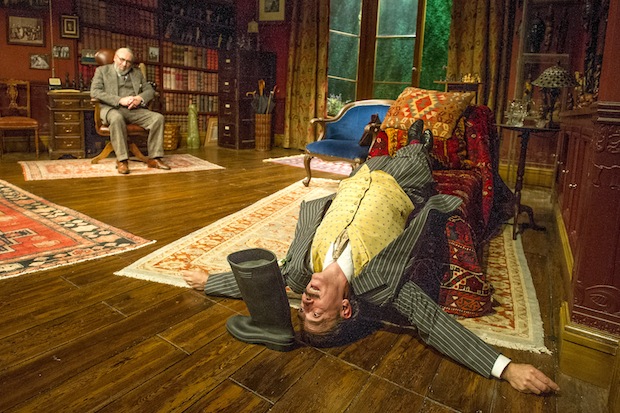Terry Johnson’s acclaimed farce Hysteria opens in Sigmund Freud’s Hampstead home in 1938. The godfather of psychobabble is ambushed by a beautiful maniac named Jessica, who forces him to analyse her, and then hides in his closet and strips naked. Along comes Freud’s old chum Yahuda, a bumbling twerp who doubles as the farce’s authority figure. His presence forces Freud to improvise countless daft wheezes in order to prevent Jessica from being discovered. You may wonder if Freud is the best candidate to star in this kind of sex caper. And you’d be right. He is, in fact, the worst candidate.
Having spent 40 years treating mental illness, Freud has only to open the closet door, and say, ‘Look, Yahuda, a deranged exhibitionist is hiding in my consulting room. Happens all the time. Put your clothes on, dear, and go home.’ Problem solved. Even if this explanation were untrue it would be convincing. But it is true. And yet Freud chooses to play the victim and to subordinate himself to Jessica’s manipulative hoax.
His false behaviour kills the comedy. Characters in a farce don’t cease to behave logically just because they’re in a farce. Their predicament should be so arranged as to make logical choices absurd. If Freud desired Jessica then his attempts to keep her hidden would be warranted, and funny. But his physical coldness to her is constantly stressed.
Salvador Dalí then arrives (not sure why), and runs around shrieking like an ambulance siren. His foaming megalomania prompts this aside, ‘I’ve never seen a more concise example of a Spaniard,’ which sounds like a caption from a Punch cartoon of around 1850. Freud, still acting with groundless stupidity, decides to pass Jessica off as Dalí’s Russian wife Gala.









Comments
Join the debate for just £1 a month
Be part of the conversation with other Spectator readers by getting your first three months for £3.
UNLOCK ACCESS Just £1 a monthAlready a subscriber? Log in